Medicinal mushrooms offer numerous benefits, serving as a rich source of nutrients and bioactive compounds with a significant impact on our health. Notably, these mushrooms possess the ability to enhance and strengthen our immune system. Research has extensively examined the intricate effects of mushrooms on immune response pathways, highlighting their potential in implementing antitumor mechanisms.

Cordyceps:
Health Benefits:
- Energy and Stamina: Cordyceps have been traditionally used to boost energy levels and enhance physical performance. They are believed to increase oxygen utilization and improve endurance.
- Immune Support: Cordyceps contain bioactive compounds that may help regulate the immune system, potentially enhancing its ability to fight infections.
- Anti-inflammatory Properties: Some studies suggest that cordyceps possess anti-inflammatory effects, which could benefit conditions associated with inflammation.
Incorporating Cordyceps Mushroom into your daily diet is an effortless way to reap numerous benefits for your health and well-being.
-
Cordyceps Supplements: One of the simplest ways to consume Cordyceps is by taking it in supplement form, such as capsules, tablets, or powders. These supplements are typically available in health food stores or online retailers. Follow the dosage instructions provided on the product label or consult with a healthcare professional for personalized recommendations.
-
Smoothies: Add Cordyceps powder to your favorite smoothie recipes. Blend it with fruits, leafy greens, plant-based milk, and other superfoods like chia seeds or flaxseeds for a nutritious and energizing beverage. Cordyceps powder blends well with sweet and savory flavors, so feel free to experiment with different combinations.
-
Tea or Coffee: Mix Cordyceps powder into your morning cup of tea or coffee for an added boost of energy and vitality. Cordyceps has a subtle, earthy flavor that complements the taste of these beverages. You can also combine Cordyceps with other adaptogenic herbs like ashwagandha or rhodiola for a potent energy-boosting blend.
-
Soups and Broths: Incorporate Cordyceps into homemade soups, broths, and stews for a nourishing and immune-supportive meal. Simply add dried Cordyceps slices or Cordyceps extract to your favorite soup recipes during the cooking process. Cordyceps pairs well with chicken, vegetables, and aromatic herbs like ginger and garlic.
-
Salad Dressings: Mix Cordyceps powder or extract into homemade salad dressings for an extra nutritional punch. Combine it with olive oil, lemon juice, Dijon mustard, honey, and herbs to create a flavorful dressing that can be drizzled over salads, grain bowls, or roasted vegetables.
-
Energy Bars or Balls: Make homemade energy bars or protein balls using Cordyceps powder as one of the ingredients. Combine it with nuts, seeds, dried fruits, oats, and a binder like nut butter or dates. Roll the mixture into bite-sized balls or press it into a pan to create bars for a convenient and nutritious snack on the go.
-
Baked Goods: Incorporate Cordyceps powder into baked goods like muffins, pancakes, or energy bars. Substitute a portion of the flour in your recipes with Cordyceps powder to boost the nutritional content of your baked treats. Cordyceps pairs well with flavors like cocoa, cinnamon, and vanilla.
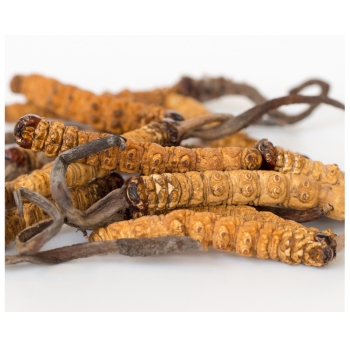 Nutritional Value:
Nutritional Value:
Cordyceps are low in calories and fat but rich in protein, fiber, and various vitamins and minerals such as vitamin B12, iron, and zinc.
Cultural and Historical Significance
Traditional Chinese Medicine (TCM): Cordyceps has a long history of use in TCM, where it is valued for its purported medicinal properties. In TCM, Cordyceps is believed to tonify the kidney and lung meridians, enhance vitality, and support respiratory and immune health.
Tibetan Medicine: Cordyceps sinensis, known as "Yartsa Gunbu" in Tibetan, is highly esteemed in Tibetan medicine for its aphrodisiac and rejuvenating properties. It has been used traditionally to treat a variety of ailments, including fatigue, kidney disorders, and respiratory conditions.
Folklore and Mythology: Cordyceps has captured the imagination of people across cultures, inspiring folklore, legends, and myths. In some Tibetan and Chinese folklore, Cordyceps is revered as a mythical elixir of immortality or a symbol of wealth and prosperity.
Cautions:
While cordyceps are generally considered safe for most people when consumed in moderation, individuals with autoimmune disorders or bleeding disorders should exercise caution and consult a healthcare professional before using them.
Cordyceps are unique in that they are not typical mushrooms but rather a parasitic fungus that grows on the larvae of insects. They have a long history of use in traditional Chinese medicine.
Cordyceps sinensis, the most well-known species, is found in the Himalayas and Tibetan Plateau and has been harvested for centuries for its medicinal properties.
Health Benefits:
- Brain Health: Lion's Mane mushrooms contain compounds that may stimulate the growth of nerve cells and support cognitive function. They are often used to enhance memory and focus.
- Nerve Regeneration: Some research suggests that Lion's Mane may promote nerve regeneration and repair, making it potentially beneficial for conditions like nerve damage and neuropathy.
- Mood Support: Preliminary studies indicate that Lion's Mane extract may have antidepressant and anti-anxiety effects, possibly due to its impact on brain chemistry.
Incorporating Lion Mane Mushroom into your daily diet is simple and beneficial.
-
Lion's Mane Stir-Fry: Add sliced or chopped Lion's Mane mushroom to your favorite stir-fry recipe. Stir-fry it with a variety of vegetables such as bell peppers, broccoli, carrots, and snow peas. Season with soy sauce, garlic, ginger, and a dash of sesame oil for a flavorful and nutritious meal.
-
Lion's Mane Soup: Use Lion's Mane mushroom as an ingredient in soups and broths. Simply add sliced or diced Lion's Mane to vegetable, chicken, or miso soup for added texture and flavor. Combine it with other ingredients like tofu, noodles, greens, and herbs for a comforting and nourishing bowl of soup.
-
Lion's Mane Omelets or Scramble: Incorporate Lion's Mane mushroom into your morning eggs for a nutritious breakfast. Sauté diced Lion's Mane with onions, spinach, and tomatoes before adding beaten eggs to create a delicious omelets or scramble. Top with cheese or avocado for extra flavor and creaminess.
-
Lion's Mane Pasta: Use Lion's Mane mushroom as a meat substitute in pasta dishes. Sauté sliced or chopped Lion's Mane with garlic, onions, and herbs before tossing it with cooked pasta and your favorite pasta sauce. Add some grated Parmesan cheese and fresh basil for a satisfying and hearty meal.
-
Lion's Mane Tacos or Wraps: Use Lion's Mane mushroom as a filling for tacos, wraps, or burritos. Sauté sliced Lion's Mane with taco seasoning, onions, and bell peppers until tender and caramelized. Serve the mixture in taco shells or tortillas with toppings like salsa, avocado, lettuce, and cheese for a tasty and plant-based meal.
-
Lion's Mane Risotto: Incorporate Lion's Mane mushroom into creamy risotto for a gourmet meal. Sauté diced Lion's Mane with shallots and garlic before adding Arborio rice and vegetable broth. Stir continuously until the rice is cooked and creamy, then finish with Parmesan cheese, fresh herbs, and a squeeze of lemon juice.
-
Lion's Mane Smoothie: Add Lion's Mane powder to your daily smoothie for an extra boost of nutrients. Blend it with fruits like bananas, berries, and mango, along with leafy greens, protein powder, and your choice of milk or yogurt. The earthy flavor of Lion's Mane pairs well with sweet and tangy fruits in smoothies.
-
Lion's Mane Tea: Brew Lion's Mane mushroom into a tea for a soothing and invigorating beverage. Simply steep dried Lion's Mane slices or powder in hot water for several minutes, then strain and enjoy. You can also add honey, lemon, or ginger for added flavor.
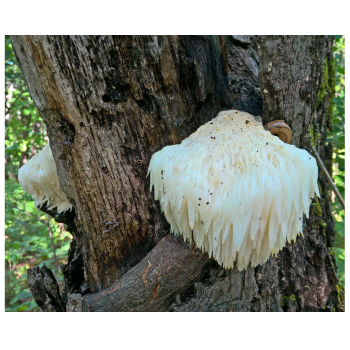 Nutritional Value:
Nutritional Value:
- Lion's Mane mushrooms are low in calories and fat but contain notable amounts of protein, fiber, vitamins (such as B vitamins), and minerals (like potassium and phosphorus).
Cultural and Historical Significance
- Japanese and Chinese Cuisine: Lion's Mane mushroom, known as "Yamabushitake" in Japan and "Hou Tou Gu" in China, has been used in traditional cuisine for centuries. It is valued for its delicate flavor and unique texture, often featured in soups, stir-fries, and hot pot dishes.
- Buddhist Tradition: Lion's Mane mushroom holds significance in Buddhist culture, where it is sometimes associated with spiritual enlightenment and mental clarity. Monks and practitioners seeking heightened awareness and concentration may consume Lion's Mane as part of their diet or herbal regimen.
- Ethnomycology: Indigenous peoples in various regions have used Lion's Mane mushroom for its potential medicinal properties, including cognitive enhancement and nerve regeneration. Traditional knowledge of Lion's Mane's benefits has been passed down through generations in these cultures.
Cautions:
- Lion's Mane is generally considered safe for most people when consumed as a food or dietary supplement. However, individuals with mushroom allergies or those taking blood thinners should use caution and consult a healthcare professional.
Interesting Facts:
- Lion's Mane mushrooms have a distinctive appearance, with cascading white spines that resemble a lion's mane, hence their name.
- In addition to its culinary and medicinal uses, Lion's Mane is being studied for its potential role in nerve regeneration and neuroprotection, with implications for treating neurological disorders like Alzheimer's disease and Parkinson's disease.
Turkey Tail:
Health Benefits:
- Immune Support: Turkey Tail mushrooms contain polysaccharides such as beta-glucans, which may enhance immune function and help the body fight infections and diseases.
- Antioxidant Properties: Turkey Tail is rich in antioxidants, which can help neutralize harmful free radicals and protect cells from oxidative damage.
- Gut Health: Some research suggests that Turkey Tail may support gut health by promoting the growth of beneficial gut bacteria and balancing the gut microbiota.
Discover simple ways to integrate Turkey Tail Mushroom into your everyday meals
-
Turkey Tail Tea: Brew Turkey Tail mushroom slices or powder into a soothing and nourishing tea. Simply steep dried Turkey Tail slices or powder in hot water for 10-15 minutes, then strain and enjoy. You can add honey, lemon, or ginger for extra flavor.
-
Turkey Tail Broth: Add Turkey Tail mushroom to homemade broths and soups for added depth of flavor and nutritional benefits. Simply simmer dried Turkey Tail slices or powder with vegetables, herbs, and bones (if making bone broth) to create a flavorful and nutrient-rich broth base.
-
Turkey Tail Smoothie: Incorporate Turkey Tail powder into your daily smoothie for an extra boost of nutrients. Blend it with fruits like bananas, berries, and pineapple, along with leafy greens, protein powder, and your choice of milk or yogurt. The mild flavor of Turkey Tail pairs well with a variety of fruits in smoothies.
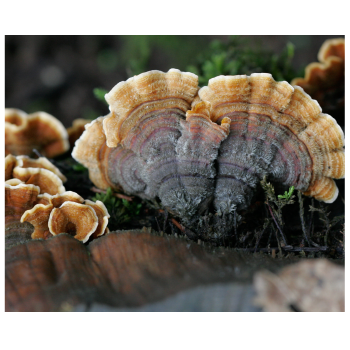 Nutritional Value:
Nutritional Value:
- Turkey Tail mushrooms are low in calories and fat but provide fiber, protein, vitamins (including B vitamins), and minerals such as selenium and copper.
Cultural and Historical Significance
Indigenous Healing Practices: Turkey Tail mushroom has been used for centuries by indigenous peoples in North America and other regions for its potential medicinal properties. It holds cultural significance in indigenous healing practices, where it is valued for its immune-modulating and healing properties.
Spiritual Symbolism: In some indigenous cultures, Turkey Tail mushroom may hold spiritual significance and be used in ceremonial rituals or as a symbol of connection to nature and the spirit world. Its vibrant colors and unique growth patterns are sometimes associated with spiritual themes and teachings.
Modern Research: Turkey Tail mushroom has gained attention in recent years for its potential role in supporting immune function and its use in integrative cancer care. Traditional knowledge of Turkey Tail's benefits has sparked scientific interest and research into its medicinal properties.
Cautions:
- Turkey Tail mushrooms are generally safe for consumption as food or dietary supplements. However, individuals with mushroom allergies or those taking immunosuppressant medications should use caution and consult a healthcare professional.
Interesting Facts:
- Turkey Tail mushrooms are named for their colorful, banded appearance, which resembles the tail feathers of a turkey.
- In traditional Chinese medicine and other indigenous healing practices, Turkey Tail has been used for centuries to support immune function and promote overall health and vitality.
Reishi:
Health Benefits:
- Stress Reduction: Reishi mushrooms are adaptogens, meaning they may help the body adapt to stress and promote a sense of calmness and relaxation.
- Immune Modulation: Reishi contains compounds like beta-glucans and triterpenes, which have been shown to modulate immune function and enhance the body's defense against infections and diseases.
- Liver Support: Reishi is believed to support liver health and detoxification processes, potentially benefiting conditions like fatty liver disease and hepatitis.
How to incorporate Reishi Mushroom into your everyday diet
-
Reishi Tea: Brew Reishi mushroom slices or powder into a soothing tea. Simply simmer dried Reishi slices or powder in hot water for 20-30 minutes, then strain and enjoy. You can add honey, lemon, or ginger for extra flavor.
-
Reishi Coffee: Mix Reishi mushroom powder into your morning cup of coffee for an added boost of nutrients and energy. Simply stir in a teaspoon of Reishi powder until dissolved, then sweeten to taste with your preferred sweetener.
-
Reishi Smoothie: Incorporate Reishi powder into your daily smoothie for an extra nutritional punch. Blend it with fruits like bananas, berries, and mango, along with leafy greens, protein powder, and your choice of milk or yogurt. The earthy flavor of Reishi pairs well with a variety of fruits in smoothies.
-
Reishi Soup: Add Reishi mushroom slices or powder to homemade soups and broths for added depth of flavor and health benefits. Simply simmer dried Reishi with vegetables, herbs, and bones (if making bone broth) to create a flavorful and nutrient-rich base for your soups.
-
Reishi Stir-Fry: Incorporate Reishi mushroom slices into your favorite stir-fry recipes. Stir-fry them with a variety of vegetables such as bell peppers, broccoli, carrots, and snap peas. Season with soy sauce, garlic, ginger, and sesame oil for a flavorful and nutritious meal.
-
Reishi Salad Dressing: Mix Reishi powder into homemade salad dressings for an extra nutritional boost. Combine it with olive oil, vinegar, mustard, honey, and herbs to create a flavorful dressing that can be drizzled over salads, grain bowls, or roasted vegetables.
-
Reishi Capsules or Tinctures: If you prefer a more convenient option, consider taking Reishi mushroom supplements in capsule or tincture form. Follow the dosage instructions provided on the product label or consult with a healthcare professional for personalized recommendations.
-
Reishi Chocolate: Incorporate Reishi powder into homemade chocolate recipes for a healthy and indulgent treat. Mix Reishi powder with melted cocoa butter, cocoa powder, honey, and vanilla extract, then pour the mixture into molds and chill until set.
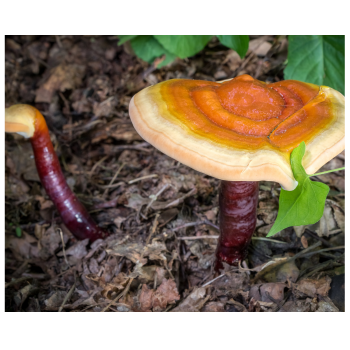 Nutritional Value:
Nutritional Value:
- Reishi mushrooms are low in calories and fat but contain polysaccharides, proteins, fiber, vitamins (especially B vitamins), and minerals like potassium and phosphorus.
Cultural and Historical Significance
- Chinese Daoism: Reishi mushroom, known as "Lingzhi" in China and "Reishi" in Japan, holds a revered status in Chinese Daoist culture. It is often depicted in Daoist art and literature as a symbol of longevity, spiritual potency, and immortality.
Herbal Medicine: Reishi has been used for centuries in traditional Chinese medicine (TCM) and other herbal medicine systems for its purported health benefits. It is believed to tonify the body's vital energy (Qi), support immune function, calm the mind, and promote overall well-being.
Imperial Tribute: Historically, Reishi mushroom was reserved for royalty and nobility in ancient China, where it was considered a precious herbal remedy and a symbol of good fortune and prosperity. It was often presented as a tribute to emperors and rulers.
Cautions:
- Reishi mushrooms are generally safe for most people when consumed in moderation. However, individuals taking blood-thinning medications or those with low blood pressure should use caution and consult a healthcare professional.
Interesting Facts:
- Reishi mushrooms have a long history of use in traditional Chinese medicine, where they are revered as the "mushroom of immortality" and used to promote longevity and overall well-being.
- Reishi mushrooms have a woody and bitter taste, which makes them less suitable for culinary use but well-suited for preparing teas, tinctures, and extracts for medicinal purposes.
Shiitake:
Health Benefits:
- Heart Health: Shiitake mushrooms contain compounds like eritadenine and beta-glucans, which have been shown to lower cholesterol levels and support cardiovascular health.
- Immune Enhancement: Shiitake mushrooms contain polysaccharides that may enhance immune function and increase the body's resistance to infections and diseases.
- Antioxidant Properties: Shiitake is rich in antioxidants, which can help protect cells from oxidative damage and reduce the risk of chronic diseases.
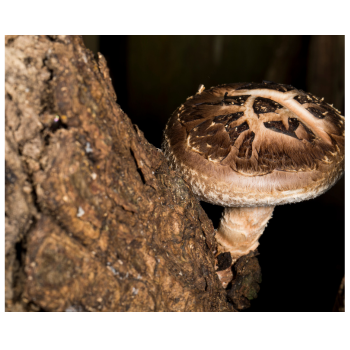 Nutritional Value:
Nutritional Value:
- Shiitake mushrooms are low in calories and fat but provide protein, fiber, vitamins (especially B vitamins like niacin and riboflavin), and minerals such as copper, manganese, and zinc.
Incorporating Shiitake mushrooms into your everyday diet
-
Stir-Fries and Sautees: Use sliced Shiitake mushrooms in stir-fries and sautés for a savory and meaty addition to your dishes. Stir-fry them with a mix of vegetables, tofu, or meat, and season with soy sauce, garlic, ginger, and sesame oil for a delicious meal.
-
Soups and Stews: Add sliced or diced Shiitake mushrooms to soups, stews, and broths to enhance their flavor and texture. Shiitake mushrooms add depth to the broth and pair well with ingredients like noodles, greens, and protein sources.
-
Salads: Incorporate sliced raw or marinated Shiitake mushrooms into salads for an earthy and umami flavor. You can add them to leafy green salads, grain salads, or pasta salads for an extra nutritional boost.
-
Rice and Grain Dishes: Mix cooked Shiitake mushrooms into rice, quinoa, or other grain dishes for added flavor and nutrients. You can also stuff Shiitake mushrooms with seasoned grains for a hearty and satisfying vegetarian meal.
-
Pasta and Noodle Dishes: Use sliced or diced Shiitake mushrooms in pasta and noodle dishes for a rich and savory taste. Add them to sauces, stir-fries, or creamy pasta dishes for an extra layer of flavor and texture.
-
Stuffed Mushrooms: Stuff whole Shiitake mushrooms with a flavorful filling for a delicious appetizer or side dish. Fill them with a mixture of breadcrumbs, cheese, herbs, and spices, then bake until golden and crispy.
-
Pizza Toppings: Use sliced Shiitake mushrooms as a topping for homemade or store-bought pizzas. They add a savory and meaty flavor to pizzas, especially when paired with other vegetables, cheeses, and sauces.
-
Grilled or Roasted: Grill or roast whole Shiitake mushrooms to bring out their rich and smoky flavor. Brush them with olive oil, season with herbs and spices, and cook until tender and golden brown.
-
Shiitake Bacon: Slice Shiitake mushrooms thinly, marinate them in a mixture of soy sauce, maple syrup, and liquid smoke, then bake until crispy. Use Shiitake bacon as a plant-based alternative to traditional bacon in sandwiches, salads, and wraps.
-
Shiitake Powder: Grind dried Shiitake mushrooms into a powder and use it as a seasoning for soups, sauces, marinades, and dressings. Shiitake powder adds depth of flavor and nutritional benefits to a variety of dishes.
Cultural and Historical Significance
- Japanese Cuisine: Shiitake mushroom, known as "Shiitake" in Japanese, is a staple ingredient in Japanese cuisine. It has been cultivated and consumed in Japan for centuries, valued for its rich umami flavor and versatile culinary applications in soups, stir-fries, sushi, and noodle dishes.
- Folklore and Tradition: In Japan and other East Asian cultures, Shiitake mushroom holds cultural significance and is often associated with longevity, prosperity, and good fortune. It is sometimes included in traditional celebrations, rituals, and gifts as a symbol of abundance and happiness.
- Shiitake Cultivation: Shiitake cultivation has a long history in East Asia, where it was traditionally grown on logs or stumps in forested areas. The cultivation of Shiitake mushrooms has played a role in rural economies and agricultural practices, providing livelihoods for farmers and sustaining traditional methods of mushroom cultivation.
Cautions:
- Shiitake mushrooms are generally safe for consumption as food. However, individuals with mushroom allergies or those taking blood-thinning medications should use caution and consult a healthcare professional.
Interesting Facts:
- Shiitake mushrooms have been cultivated in East Asia for thousands of years and are widely used in Asian cuisine for their rich umami flavor and meaty texture.
- In addition to their culinary uses, Shiitake mushrooms have been studied for their potential anti-cancer, anti-inflammatory, and antimicrobial properties, with promising results in laboratory and animal studies.
References:
https://www.ncbi.nlm.nih.gov/pmc/articles/PMC7826851/
https://www.ncbi.nlm.nih.gov/pmc/articles/PMC10384337/#:~:text=The%20most%20popular%20mushrooms%20among,(Lentinula%20edodes%20(Berk.)
https://www.cancer.gov/about-cancer/treatment/cam/hp/mushrooms-pdq#:~:text=Medicinal%20mushrooms%20have%20been%20approved,and%20on%20direct%20antitumor%20mechanisms.
https://www.cnet.com/health/medical/do-medicinal-mushrooms-really-work/
https://www.mskcc.org/cancer-care/integrative-medicine/herbs/reishi-mushroom
https://www.hsph.harvard.edu/nutritionsource/food-features/mushrooms/
https://namyco.org/scientific-research-medicinal-fungi/
https://www.nationalgeographic.com/science/article/mushroom-supplements-chaga-reishi-lions-mane

